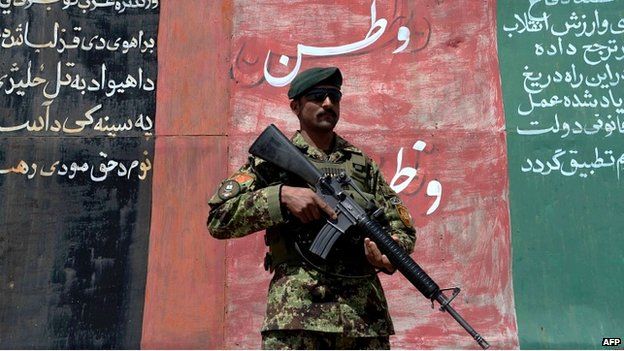Afghanistan attacks mark Taliban's summer offensive
- Published

Kabul's international airport came under attack on Monday as the Taliban announced the start of their annual summer offensive.
Two rockets hit the airport but did not cause any casualties.
There were also attacks on the US airbase in Bagram, at a courthouse in Jalalabad in the east and elsewhere.
Afghanistan is in transition, with a new president to be elected next month and foreign forces due to leave by the end of 2014.
The BBC's David Loyn in Kabul says the offensive has begun now the poppy harvest is in and the Taliban can recruit fighters more easily.
The Taliban offensive began with attacks before dawn on Monday first on the huge Bagram airbase north of the capital.
One rocket fell outside the base, and three others were launched, but did not cause any damage.
Two rockets were then launched at Kabul airport, but did not cause any casualties and the airport remains open.
Gunmen then moved into a complex of government buildings, including a court, in the eastern city of Jalalabad, after a suicide attacker blew open the gates.
Afghan security forces are battling to retake control of the buildings.
There are also reports of attacks on Ghazni in the centre, and Helmand in the south-west of the country.
The attacks come as a think tank, the International Crisis Group (ICG), issued a stark warning that without more funding for Afghan forces, the Taliban might make big gains after the departure of international troops.
The ICG said that while the Taliban are unlikely to retake major cities, the balance of power in rural areas is on a knife edge.
Taliban leaders said last week that the offensive, which will be the last before Nato combat troops withdraw from Afghanistan, would cleanse "the filth of the infidels" from the country.
The offensive will coincide with a second round of elections next month to choose a successor to President Hamid Karzai, who has ruled since the fall of the Taliban in 2001.
About 50,000 US-led Nato troops still deployed in Afghanistan are set to withdraw by December but a small number of US soldiers may stay on from next year on a training and counter-terrorism mission.